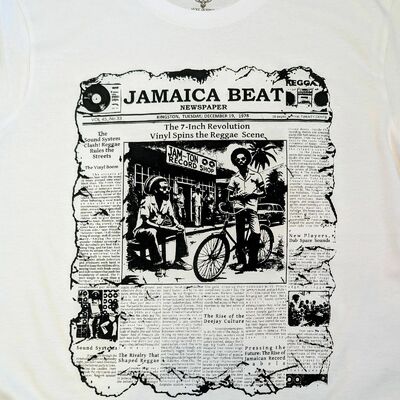Reggae in Print: Jamaica Beat Newspaper T-Shirt
The 1970s in Jamaica were a time of dynamic social and musical change. Political tensions, divisions between party supporters, and economic hardship turned Kingston into a volatile city. Amidst these struggles, however, music flourished, and reggae became a powerful medium for expressing social concerns.
Back then, musical news was mostly spread by word of mouth—on the streets, in record shops, and at sound system sessions. However, there was also a music press that documented and reported on changes within the scene, commenting on the evolution of the genre.
During the 1970s, Jamaica’s music industry was dominated by vinyl records. Labels such as Studio One, Treasure Isle, Channel One, and Black Ark produced singles that quickly found their way onto the streets and into clubs. There were no extensive distribution networks—new tracks first appeared in local record stores and were then picked up by selectors running sound systems.
Vinyl production was fast and affordable. Recordings were often made in a single take, and dub versions were pressed onto the B-side, allowing DJs and selectors to experiment with sound.
The competition between sound system crews such as King Tubby’s Hometown Hi-Fi, Coxsone Dodd’s Downbeat, and Prince Jammy’s Sound fuelled the growth of the scene. Sound system owners invested in ever more powerful speaker setups, while selectors and operators fought for access to exclusive dubplates—unique versions of tracks that could not be purchased in shops.
The Jamaica Beat Newspaper T-shirt is a visual tribute to that era. Its design features snippets of articles about record labels, vinyl culture, and sound system rivalries. The retro, black-and-white newspaper aesthetic captures the spirit of a time when reggae was not just music—it was a raw and powerful social statement.
Bless up!

